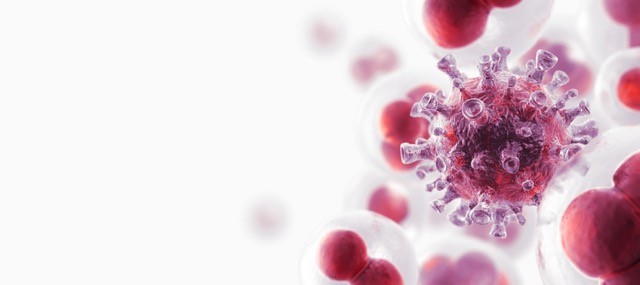Published December 14, 2018 Author: ALTCARE STAFF
Recent studies have concluded childbirth may increase the risk of breast cancer in women. However, emerging technologies for overcoming genetic and molecular aberrations may help cancer patients across all spectrums.
The Annals of Internal Medicine, a peer-reviewed medical journal, published a report that analyzed 15 studies from around the world. The conclusion suggests the risk for mothers was 80 percent higher than women who did not give birth. (1)
Among other findings, the report said:
- Overall, younger women are less at risk of developing breast cancer than women over age 50.
- Researchers found no increased risk for women who had their first child before age 25.
Hazel Nichols, the first author of the study, is an assistant professor of epidemiology at Gillings School of Global Public Health at the University of North Carolina. “What we saw was this pattern where risk was highest about five years after birth, and then it gradually declined as time went on,” Nichols told CNN. (2)
“If we took the women in our study and started following them around age 40, for example, and over the next 10 years by about age 50, we would have had about 2.2% of women develop breast cancer in the group that had had a recent child, and we would have had about 1.9% in the women who had not had any children.”
The Centers for Disease Control and Prevention says breast cancer is the most common cancer in women in the United States. In the U.S., about 41,000 women (and 450 men) die from breast cancer each year.
The World Health Organization estimates that 627,000 women have died this year from breast cancer worldwide, which is about 15% of all cancer deaths among women.
However, investors and entrepreneurs are at the forefront of new diagnostic tools that can identify cancer cell mutations. This technology could help create more targeted therapies for cancer patients.
Dr. Koichi Takahashi is part of a team at MD Anderson Cancer Center that is using a startup company’s technology to identify cellular mutations in acute myeloid leukemia cancer cells.
Dr. Takahashi’s findings were presented at an American Society for Hematology conference. Using Mission Bio’s “Tapestri” platform, researchers sequenced more than 500,000 cells across 70 patients.
“These results demonstrate the power of analyzing heterogeneity for the study and treatment of cancer patients,” Dr. Takahashi said. “Tapestri’s ability to precisely identify cancer sub-clones throughout treatment and disease progression brings us closer to delivering on the promise of precision medicine.” (3)
He added, “Not only can we now better understand how clonal heterogeneity informs relapse of the disease, but we can apply these learnings to guide dynamic therapies and confront the disease head-on.”
Researchers are focusing on “precision medicine,” which is founded on the belief that delivering the right medicine to the right patient at the right time and in the proper sequence is a game-changer. At its core is understanding the genetic and molecular aberrations that are causing cancer.
Cambridge Cancer Genomics also is developing new technologies for the disease.
“When you drill down into the DNA changes behind cancer, you quickly find that no two tumors are the same. To apply cancer therapies more successfully to any given tumor, we need a deeper understanding of what exactly has gone wrong in each case at a molecular level,” said Dr. Harry Clifford, a co-founder and chief technology officer at Cambridge Cancer Genomics.
“This starts with effective tools to capture that information. The approaches we’re developing at CCG will have widespread applications, from identifying targets for new therapy development, to deciding which personalized approach is best for a given patient.”
Meanwhile, the Journal of Clinical Oncology has released a report that contends current guidelines for genetic testing of breast cancer patients limit the number of women who can get tested. (4)
As a result, patients who do not undergo these tests may not receive appropriate treatment for cancer.
BRCA 1 and BRCA 2 are tumor suppressor genes that everyone has; if a defect or mutation occurs in one or both of these genes, the likelihood of breast cancer is increased.
“Back then … genetic testing was incredibly difficult to do and expensive; it cost about $5,000 to just test the two genes,” said Dr. Peter Beitsch, co-author of the study and a cancer surgeon in Texas. The guidelines “originated really as an economic roadblock to try to decrease the overall cost of health care in America.”
With developing technologies dotting the cancer landscape, the hope is that investments in these treatments will level the playing field. Insurance is an obstacle that every cancer patient must overcome, regardless of whether using conventional or natural, alternative, or integrative treatments. Indeed the “war on cancer” is ongoing – and it seems more researchers, investors, doctors, and tech-minded people are looking for answers.
Citations:
(1) Nichols HB, Schoemaker MJ, Cai J, Xu J, Wright LB, Brook MN, et al. Breast Cancer Risk After Recent Childbirth: A Pooled Analysis of 15 Prospective Studies. Ann Intern Med. [Epub ahead of print ] doi: 10.7326/M18-1323 http://annals.org/aim/article-abstract/2718682/breast-cancer-risk-after-recent-childbirth-pooled-analysis-15-prospective
(2) Howard, Jacqueline. Increased breast cancer risk might last decades after childbirth, study says. CNN, https://www.cnn.com/2018/12/10/health/breast-cancer-childbirth-study/index.html
(3) Shieber, Jonathan. Companies tracking mutations in cancer cells can provide a key to unlocking better therapies. TechCrunch, https://techcrunch.com/2018/12/13/companies-tracking-mutations-in-cancer-cells-can-provide-a-key-to-unlocking-better-therapies/
(4) Peter D. Beitsch, Pat W. Whitworth, Kevin Hughes, Rakesh Patel, Barry Rosen, Gia Compagnoni, Paul Baron, Rache Simmons, Linda Ann Smith, Ian Grady, Michael Kinney, Cynara Coomer, Karen Barbosa, Dennis R. Holmes, Eric Brown, Linsey Gold, Patricia Clark, Lee Riley, Samuel Lyons, Antonio Ruiz, Sadia Kahn, Heather MacDonald, Lisa Curcio, Mary Kay Hardwick, Shan Yang, Ed D. Esplin, and Robert L. Nussbaum. Underdiagnosis of hereditary breast cancer: Are genetic testing guidelines a tool or an obstacle? doi:10.1200/JCO.18.01631 http://ascopubs.org/doi/full/10.1200/JCO.18.01631

